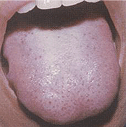Chinese Medicine Diagnosis on Missed Period
TCM diagnosis for missed period relies on modern methods and is also in combination with syndrome differentiation. That means when TCM physicians consider a missed period case, they usually take reference from modern diagnostic results, to help confirming the condition and clarifying whether it is applicable for TCM treatment. Then they further identify the presenting syndrome of the patient.
A syndrome refers to the pattern of signs and symptoms that reflects the pathology of a disease at a certain stage, which give clues to physicians to understand the entire course of pathological changes and provide guidelines for clinical treatment. The clinical information for diagnosing a syndrome can only be gathered through particular examination techniques that require years of practical training to become skillful.
 |
 |
 |
| Asiatic cornelian cherry fruit | Eucommia bark | Cuttlefish bone |
Below are the common syndromes for missed period in TCM.
Deficiency of kidney-qi
Individuals usually experienced delayed onset of menstruation during puberty. The cycles are delayed, menses become thin and scanty, then gradually cease. Other accompanying signs include general weakness, physical immaturity or under development, pale face, dizziness, ear ringing, frequent urination, soreness in the back and knees. On examination, the tongue is pale; the pulse is deep and weak.Depletion of kidney essence
The cycles delay and menses become less, and then gradual appear cessation of menstruation. Other accompanying signs include weakness and soreness in the back and knees, lower limb weakness with occasional pain in the heels, insomnia, poor memory, dizziness and ear ringing. There may be vaginal dryness with extremely little discharge. On examination, the tongue is pale; the pulse is deep and weak.Deficiency of blood and qi
Delayed cycles with scanty and thin menses, then then gradual appear cessation of menstruation. Other accompanying signs are paleness or sallow face, spiritual fatigue, sleepiness, breath shortness, dizziness, blurred and darkened vision, palpitations, insomnia, and dream-disturbed sleep. There may even skin dryness and paleness, lusterless hair, pale and brittle nails. On examination, the tongue is pale; the pulse is thready and weak.Blood stasis and cold coagulation
 Individuals usually have normal menstrual cycles, but experienced a sudden cessation of menstruation. Other associated symptoms include pain in the lower abdomen that can be lessened by warmth and sharpened by deep pressure on the region, limb coldness and excessive thin and clear vaginal discharges. On examination, the tongue is dark purplish, bleeding spots may be found in the tongue tip, and with a white coating; the pulse is deep and hesitant.
Individuals usually have normal menstrual cycles, but experienced a sudden cessation of menstruation. Other associated symptoms include pain in the lower abdomen that can be lessened by warmth and sharpened by deep pressure on the region, limb coldness and excessive thin and clear vaginal discharges. On examination, the tongue is dark purplish, bleeding spots may be found in the tongue tip, and with a white coating; the pulse is deep and hesitant.Stagnation of blood and qi
Individuals experienced an irregular menstruation initially, then the cycles eases gradually or suddenly. The associated symptoms include a depressed mood, irritability, bad temper, pain in the lower abdomen that can be sharpened by deep pressure on the region, breast tenderness and chest oppression. Individuals may also have a reduced appetite and loose bowels. On examination, the tongue is normal or has a white thin coating; the pulse is deep and taut.Phlegm and dampness obstructions
 Individuals first experienced delayed periods, then menstruation gradually ceases. Other accompanying symptoms include excessive sticky and thick vaginal discharges, nausea, excess phlegm in the throat, chest oppression, abdominal bloating, fatigue and general weakness. On examination, the tongue is pale and covered by white greasy fur; the pulse is taut and rolling. Individuals are usually obese.
Individuals first experienced delayed periods, then menstruation gradually ceases. Other accompanying symptoms include excessive sticky and thick vaginal discharges, nausea, excess phlegm in the throat, chest oppression, abdominal bloating, fatigue and general weakness. On examination, the tongue is pale and covered by white greasy fur; the pulse is taut and rolling. Individuals are usually obese.It should be noted that missed period can be due to different developmental mechanisms, and so the presentations may vary from person to person. The above disharmony patterns can appear alone or in mixed form. it is not uncommon to appear many other syndrome patterns too.
Generally, physicians focus on evaluating the overall condition of individuals in making the diagnosis for missed period, which then guide for planing an effective treatment. Individuals with missed period are usually divided into deficient or excess types first. Deficient individuals usually show abdominal distention and abdominal pain that sharpened by deep pressure on the region. Excess individuals usually present with a pale complexion, spiritual fatigue, headache, and a soft abdomen without pain. The deficient type tends to select tonifying therapies, while the excess type tend to select collateral unblocking therapies.


